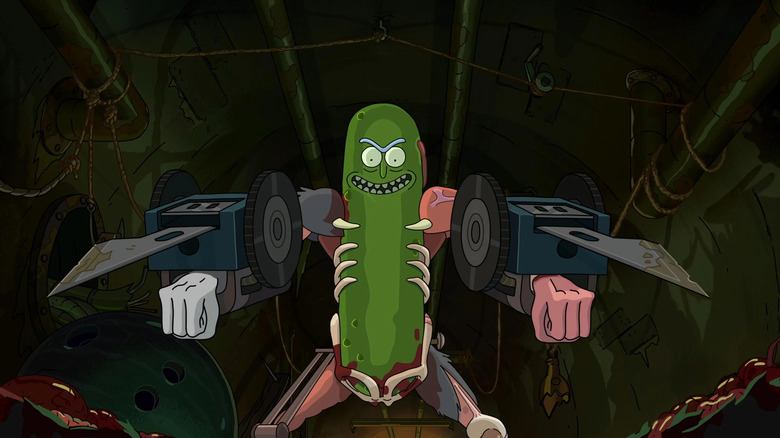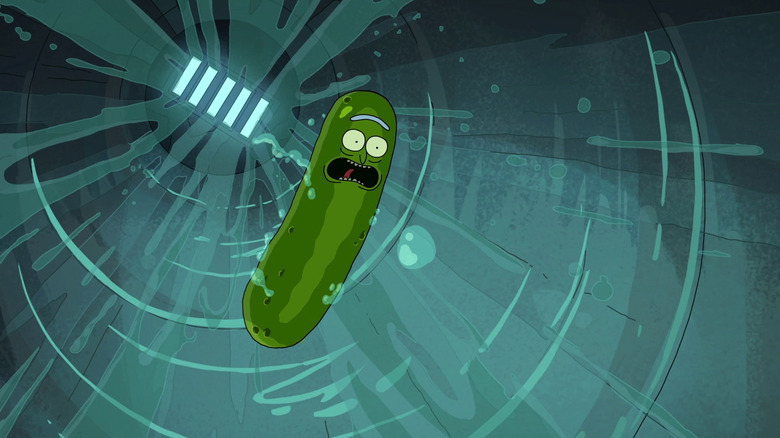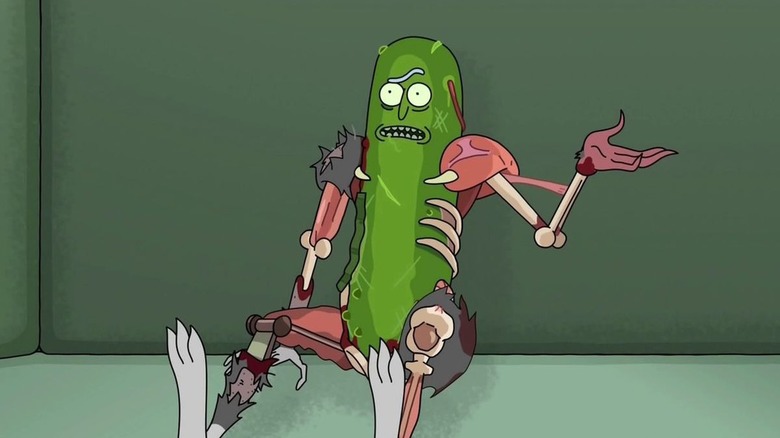Rick And Morty's Best Episode Has A Much Deeper Meaning Than You May Have Realized
In the famed "Rick and Morty" episode "Pickle Rick" (August 6, 2017), the mad scientist Rick (Justin Roiland) uses his bizarre scientific acumen to transform his body into a pickle. He initially claims that he conducted his weird experiment for reasons of study, but it's made clear right away that he turned himself into a pickle specifically to avoid going to group therapy with his family. His daughter Beth (Sarah Chalke) leaves Rick alone in his garage, taking the syringe of antidote that would transform him back into a human. Rick, not being able to move as a pickle, is batted around by a cat and knocked into a sewer. He manages to create locomotion for himself using his tongue on a cockroach's exposed brain. He is eventually able to construct gross, muscular limbs out of rat cadavers, as well as weapons and jet packs from other sewer detritus. Rick, as a rat pickle, will end up infiltrating a crime boss' lair. The conflagration is the most violent the series has ever seen.
The disgusting rat guts, absurd pickle experiment, and hallucinatory, violent gangster slayings have made "Pickle Rick" one of the most popular episodes of the series, and one needn't look too far to find scads of Pickle Rick merchandise online. The episode won an Annie Award and a Primetime Emmy.
The fact that Rick would rather become a dying, rat-gut-powered, pickle-based murder monster than go to therapy is in keeping with the character and in line with the central conceits of the show. In 2018, "Rick and Morty" creator Dan Harmon spoke with GQ about his show and explained how "Pickle Rick" wasn't just an exercise in surreal excess. At its heart, he said, "Pickle Rick" is about alcoholism.
The will to pickle
Many "Rick and Morty" fans might be drawn to the series for its Nietzschean underpinnings.
Rick, is a selfish, violent, cruel character. He insults everyone, from family members to the rulers of distant planets. Rick feels that life is cheap, having dabbled so long in Frankensteinian experiments where he's able to create and vanquish life on a whim. He also has traveled through time and into other dimensions, having met hundreds of parallel versions of himself. In his travels, Rick has learned that an individual's ability to survive and their willingness to assert their "will to power" takes precedence over piddling, outmoded notions like compassion, togetherness, and morality. Whether or not one admires Rick is a matter of maturity and disposition.
"Pickle Rick," however, points out the downside of that. When one is convinced of their own moral superiority, they begin to interpret their sadism and/or self-destruction as positives. Rick may be convinced he is brilliant, but he is also a heavy drinker who makes horrible decisions all the time. Dan Harmon, when writing "Pickle Rick," saw Rick's decision to turn himself into a pickle as a metaphor for his own need to stay home and drink instead of communicating with his family:
"Only at the very end of putting the script together, [I] realized that there was only one reference to Rick's drinking in the entire episode, even though the idea of being "pickled" and the actual metaphor itself ... that episode is so much about alcoholism, and yet it's the only episode of Rick And Morty where the words 'alcohol' or references to booze are completely gone, because I noticed that right at the end and pulled the one reference to him being an alcoholic out, so that it's like this pure metaphor."
Pickled. I get it.
Pickled Rick
At the end of "Pickle Rick," the mangled, guts-strewn Rick actually ends up in group therapy, still openly defiant of seeking help. Rick is convinced that he's brilliant, and cannot accept the position from therapist Dr. Wong (Susan Sarandon) that he might have any flaws. The fact is that Rick's alcoholism has been tearing the family apart and that his unchecked brilliance might be the source of his damage is not something he's willing to face.
Dr. Wong gives a brilliant speech to Rick that might very well be about an alcoholic's unwillingness to accept they have a problem. He hasn't taken a step to recovery. Dr. Wong points out that Rick, who considers himself a master of his own domain, uses his intelligence to justify the sickness around him. "You seem to alternate," she says "between viewing your own mind as an unstoppable force, and as an inescapable curse." Rick, she says, can't accept that he is more in control than he might want to acknowledge. She continues:
"You chose to come here, you chose to talk, to belittle my vocation, just as you chose to become a pickle. You are the master of your universe. And yet, you are dripping with rat blood and feces. Your enormous mind literally vegetating by your own hand. I have no doubt that you would be bored senseless by therapy. The same way I'm bored when I brush my teeth or wipe my ass. Because the thing about repairing, maintaining, and cleaning is ... it's not an adventure. There's no way to do it so wrong you might die. It's just work."
The truth, we see, is that some people would rather die as pickled vegetables than do the work necessary to grow.


